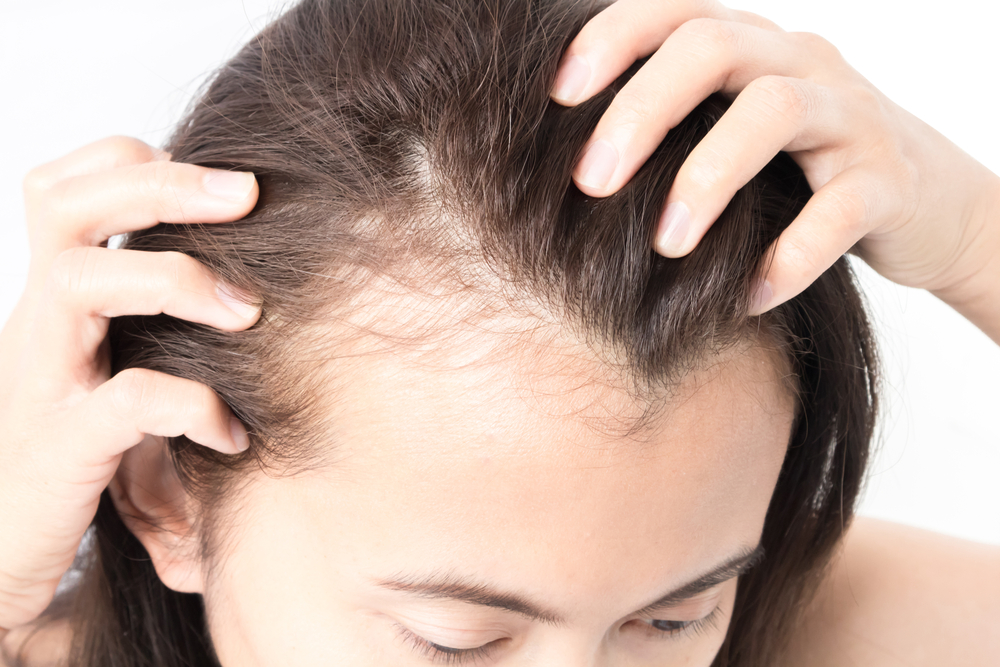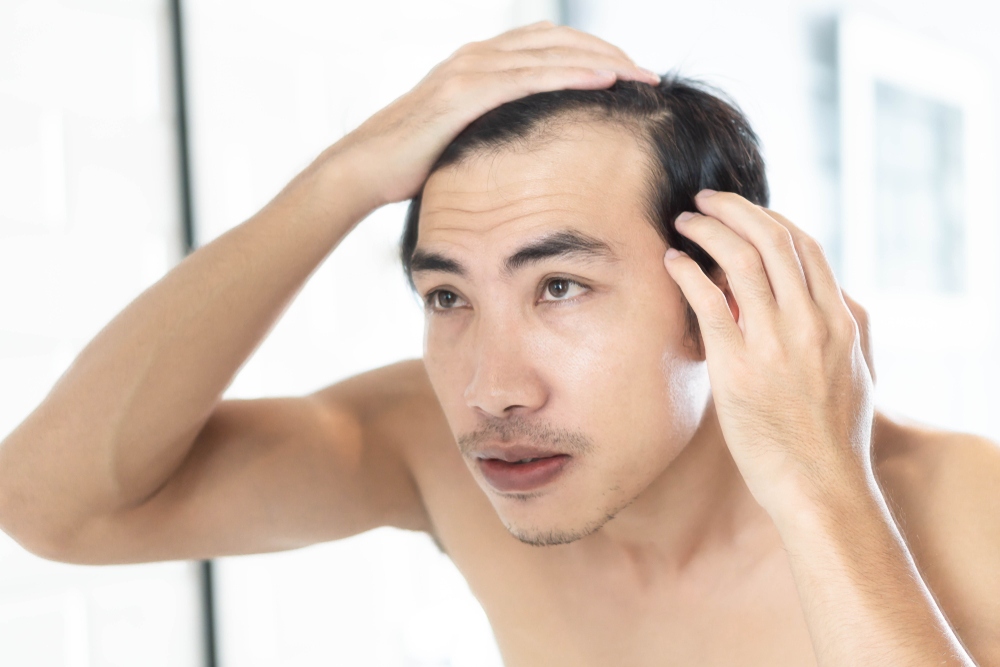Hair Loss Treatment in Sarasota, FL

Hair loss, or alopecia, is a common medical dermatology condition. It can result from natural aging, a medication side effect, or a health disorder manifestation. It can also result in total baldness, thinning of the hair, or patchy bald spots and may be confined to the scalp or affect other areas of the body.
Many SkinSmart Dermatology® patients want to preserve their hair and seek the most effective treatments. For decades, we have offered effective solutions to slow the progression of hair loss or cure underlying conditions causing the shedding.
Read on to learn more, or call 941-308-7546 to book a consultation at our Sarasota, Florida practice.
What Causes Hair Loss?
Hair loss affects men and women, with men experiencing balding more frequently. It may be temporary or permanent, depending on its cause. Some of the reasons for hair loss include:
- Male pattern baldness
- Fungal infections of the scalp
- Severe infections or high fevers
- Poor nutrition
- Certain medications
- Traumatic stress
- Trichotillomania, a psychiatric disorder involving compulsive hair-pulling
- Thyroid or pituitary disorders
- Certain skin disorders, such as eczema or psoriasis
- Autoimmune diseases, such as lupus or polycystic ovary syndrome (PCOS)
- Chemotherapy or radiation therapy
- Alopecia areata, an autoimmune disorder
- Telogen effluvium (TE), in which too many hair follicles remain in a resting state
Our board-certified dermatologists can diagnose the reason for your hair loss and provide the most appropriate treatment.
How Does a Dermatologist Diagnose Hair Loss?
Our dermatologists conduct a physical examination during hair loss consultations and ask relevant questions about your family history, medical conditions, diet, and hair care products. We can also perform a pull test, where we gently tug your hair to see how many strands come out to determine the degree of shedding. We may perform a blood test as well to identify other conditions that cause hair loss.

A scalp biopsy typically rules out fungal infections. This procedure involves gently scraping the skin or plucking a few hairs to examine the roots. If we need to examine the hair shaft more closely, light microscopy can be used to discover disorders.
How Common is Hair Loss?
There are several types of hair loss, but the most common is androgenetic alopecia (also known as male or female pattern hair loss). By age 50, men have a 50% chance of developing male pattern baldness. Women aren’t far behind, with 40% developing female pattern baldness by age 70.
Is My Hair Loss Temporary?

Many patients experience sudden and rapid hair loss (called telogen effluvium) several months after a traumatic event. Stressful events, illness, malnutrition, certain medications, and hormonal imbalances can disrupt your hair cycle where the growing phase shortens and shedding increases.
Many patients experienced TE for the first time after their COVID-19 infections, which is unsurprising considering the combination of physical illness and emotional stress. Fortunately, most cases of TE resolve on their own, though it may take several months to see improvement. If temporary hair loss is distressing, topical medications like minoxidil can speed growth.
Without a proper diagnosis, it’s hard to determine whether your hair loss is temporary or progressive. Our dermatologists can identify the type of alopecia you have and the best treatments.
Treatment for Hair Loss
Hair loss is usually treated based on its cause. For example, when it results from a fungal infection, it can be treated with antifungal medication. However, medication may be unnecessary if the condition is temporary, like hair loss resulting from cancer treatment, which typically resolves on its own.
Effective hair loss treatments include:
- Minoxidil (Rogaine®): This over-the-counter topical comes in liquid, shampoo, and foam versions and should be applied to the scalp once or twice daily. It can slow the rate of hair loss and, in some cases, help you regrow your hair. However, you’ll need to apply it consistently to maintain its effects.
- Finasteride (Propecia®): This oral prescription medication can slow hair loss in men. In some cases, you’ll notice new hair growth. Unlike minoxidil, this drug isn’t indicated for hair loss in women.
- Spironolactone: This oral medication is an effective treatment for androgenic alopecia. It’s commonly prescribed for women with PCOS.
- Oral dutasteride: This prescription is used off-label to prevent and treat hair loss.
- Microneedling: New studies show microneedling as a promising treatment for hair loss, especially when used with minoxidil.
- Hair transplant surgery: A hair transplant harvests hair from an unaffected area and moves it to a bald spot.
Each hair loss treatment has unique benefits. Some medications may work better for you than others. The best way to determine the necessary treatment is to schedule an appointment with our office.
FAQs
Can Finasteride and Minoxidil Be Used Together for Better Results?
Yes, you can use finasteride and minoxidil together. In fact, studies suggest that combining them leads to better results than using either treatment alone.
Combining both offers several benefits, including:
- It addresses hair loss from two angles (DHT reduction + follicle stimulation).
- It can lead to faster regrowth and improved hair density.
- It’s more effective for treating male pattern baldness in the early to moderate stages.
Results generally appear within 3–6 months. However, full benefits may take a year.
What Lifestyle Changes Can Support My Hair Restoration Results?
Several lifestyle changes can help maintain and support your hair restoration results:
- Healthy Diet: Protein, iron, zinc, and vitamins can strengthen hair and promote growth.
- Scalp Care: Keeping your scalp clean and hydrated creates a healthy environment for hair growth.
- Stress Management: Chronic stress can worsen hair thinning. Mindfulness practices can reduce stress and support hair health.
- Proper Hydration: Drinking enough water keeps hair follicles hydrated and prevents dryness and brittleness.
- Avoiding Smoking and Excess Alcohol: Smoking can restrict blood flow to the scalp. Excessive alcohol intake can cause nutrient deficiencies.
- Regular Exercise: Physical activity improves circulation, which helps deliver nutrients to hair follicles.
- Minimizing Heat and Chemical Treatments: Frequent use of heat styling tools, hair dyes, and chemical treatments can weaken hair and cause breakage.
- Using a Silk or Satin Pillowcase: These products lessen friction on hair while sleeping. This helps prevent breakage and split ends.
- Protecting Hair from Sun Exposure: UV rays can damage hair and scalp health.
Are Hair Loss Treatments Effective for Both Men and Women?
Yes, hair loss treatments can be effective for both men and women. There are some important differences, though, including:
- Pattern of Hair Loss: Men usually experience receding hairlines and bald spots due to male pattern baldness. Women often have diffuse thinning without complete baldness.
- Medication Response: FDA-approved medications like minoxidil are effective for both men and women. However, because of its effects on hormone levels, finasteride is generally only prescribed for men.
- Hormonal Influence: Hormonal fluctuations (pregnancy, menopause, thyroid disorders) can cause hair loss in women and influence their treatment choices.
Can I Color or Style My Hair Normally While Undergoing Treatment?
You may be able to color or style your hair while undergoing hair loss treatment. However, certain precautions can help protect your hair and maintain the best results.
Here are some considerations to keep in mind when coloring hair:
- Choose Gentle Products: Opt for ammonia-free and low-peroxide hair dyes.
- Limit Frequency: Coloring hair too often can weaken strands and lead to breakage.
- Deep Conditioning: Use hydrating masks or leave-in treatments to restore moisture.
Keep these styling tips in mind as well:
- Avoid Excessive Heat: Reduce using high-heat styling tools to prevent hair shaft damage.
- Use a Wide-Tooth Comb: This helps decrease breakage, especially when detangling wet hair.
- Be Gentle with Hairstyles: Tight ponytails, braids, or buns can stress hair follicles and contribute to shedding.
- Choose Lightweight Hair Products: Heavy gels and waxes can weigh hair down and make thinning more noticeable.
Why Choose SkinSmart Dermatology?
SkinSmart Dermatology, founded in 2005 by Dr. Elizabeth Callahan, offers expert hair loss treatments. Dr. Callahan is a double-board-certified dermatologist and Mohs micrographic surgeon. She and her team are renowned for excellence and provide advanced, patient-focused care.
SkinSmart Dermatology has earned thousands of five-star reviews, reflecting its commitment to quality and results-driven treatments. Whether addressing early-stage thinning or significant hair loss, the practice offers cutting-edge solutions in a compassionate setting.
Schedule Your Hair Loss Treatment Consultation Today
If you are experiencing hair loss and seeking treatment, visit SkinSmart Dermatology. Our providers, including board-certified dermatologist Dr. Elizabeth Callahan, are experienced in hair loss solutions and have served the Sarasota, Florida, community for over 15 years.
We treat various skin problems and care for every patient with a personal touch. Call 941-308-7546 or fill out the form on our contact page to schedule an appointment.

